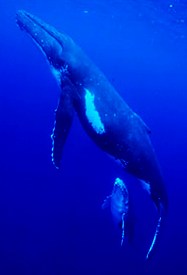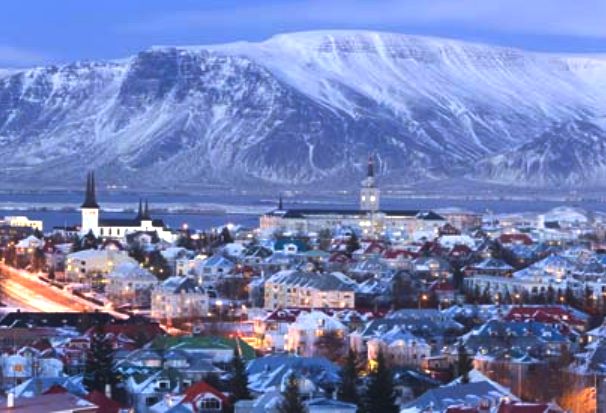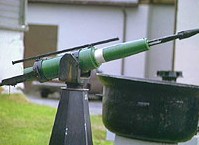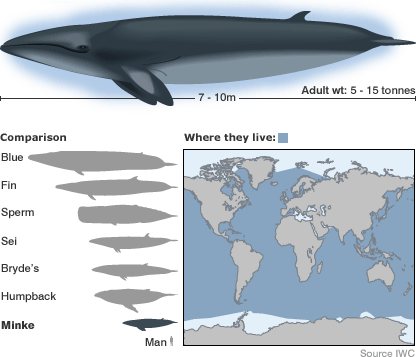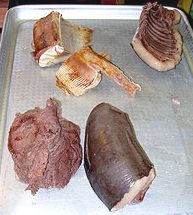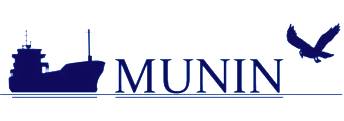|
ICELAND
|
|||||||||||||||||||||||||||||||
|
Commercial
whaling has not been on the Icelandic governments agenda
during recent years. More and more people in the tourist
trade are arguing that whaling should not start anew as
the state will definitely get more income by endorsing
whale spotting as a tourist attraction. But as so often
before, there are more views than one and while
conservationists and people in the tourist trade are all
for non-whaling. However, commentators for the local
fishing fleet maintain that whales have increased
greatly in numbers during the last few years and that a
natural environmental balance must not be put to a risk,
since we simply do not know enough about nature and
certainly have no effective controls at this time.
Although the Man
has such enormous potential to unbalance nature, which
has been demonstrated over and over again (Dodo, Bison)
The fishing lobby support the idea of recommencing whaling
for domestic commercial purposes.
Humpback whales
Paul Watson, founder of Sea Shepherd, an environment campaign group, has threatened to return to Iceland. In 1986 he sank two whalers at Reykjavík harbor. In an interview with Fréttabladid yesterday, Watson compared Iceland’s sustainable whaling policy with North Korea’s nuclear bomb testing.
Watson says the Icelandic government has disrespected public opinion with its decision to resume commercial whaling after a 17 year ban.
The Sea Shepherd leader has threatened to return to Iceland with two of his ships next summer to stop commercial whaling, which he has described as “crime.” In 1986 the organization sank two whalers, Hvalur 6 and Hvalur 7, at Reykjavík harbor and destroyed the equipment in whaling station Hvalstödin in Hvalfjördur, southwest Iceland.
The Icelandic government, and even other environmental campaign groups like Greenpeace, were outraged by this and condemned Sea Shepherd’s actions. Currently, Sea Shepherds’ ships are busy trying to prevent whaling in Japan, as well as in the Galapagos.
Icelandic whaler Hvalur 9 has still not caught any fin whale. Droplaug Ólafsdóttir of Iceland’s Marine Institute told icelandreview.com that the whales may have left for warmer waters and that they are usually hunted during summer.
RÚV.is reported that minke whale hunting will soon begin. Ben Bradshaw, UK’s Minister of Fisheries, urged the Icelandic government to reconsider its “drastic” decision on whaling in an interview with RÚV yesterday. According to RÚV, the US government is also opposed to Iceland resuming commercial whaling and has the power to block all imports from Iceland to USA.
Iceland’s Foreign Minister Valgerdur Sverrisdóttir pointed out that the USA also hunts whales and told RÚV that the US’ reaction is “hypocritical”.
Moves begin on Iceland's whaling
Britain's fisheries minister has summoned Iceland's ambassador to explain why the country has decided to start hunting endangered whales.
Ben Bradshaw called Iceland's position "inexplicable and inexcusable". On Tuesday Iceland announced it would resume commercial whaling after a hiatus of 20 years.
Conservation groups are particularly angered by plans to hunt endangered fin whales; Iceland maintains numbers are high enough to permit hunting. It disputes the assessment of scientists in IUCN, the World Conservation Union, that fin whale stocks are fragile.
'Flagrant disregard'
But Mr Bradshaw disagreed. "World opinion is rightly outraged by this flagrant disregard for international agreements," he said. "There is no rationale for this decision, and Iceland cannot even find markets for the whalemeat it gets from so-called 'scientific' whaling."
In diplomatic circles, summoning an ambassador is regarded as a fairly serious expression of displeasure. But Stefan Asmundsson, Iceland's whaling commissioner, said his government was not concerned.
"Of course we want to have good relations with the UK and other countries around the world, and we're hopeful that while perhaps not agreeing with us they will see matters from our standpoint," he told the BBC News website.
"The British government's position is well known, and we understand where they're coming from, putting whales as a separate kind of animal that cannot be hunted; but we cannot accept that."
Commercial returns
A global moratorium on commercial hunting has been in place for 20 years, with only Norway breaking it, having legally lodged a "reservation" to the moratorium when it came into force.
Since 2002 Iceland has been catching minke whales in the name of scientific research, as it is allowed to under International Whaling Commission (IWC) rules.
Whether it is legally entitled to resume commercial whaling is another matter. Having left the IWC in 1992, it rejoined a decade later expressing a reservation to the moratorium, but anti-whaling countries believe this to have been illegal.
"Iceland's decision is extremely disappointing," said New Zealand's Conservation Minister Chris Carter. "New Zealand will be making it very clear to the Icelandic government that we utterly reject their country's right to resume commercial whaling, and remain a part of the IWC."
But international reaction has not been entirely negative. Japan, which hunts more whales than any other country, welcomed Iceland's move. "The size of Iceland's catch will in no way endanger the whale population," said Fisheries Agency official Hideki Moronuki.
Japan currently hunts for scientific research, but makes no secret of its desire for a return to commercial whaling. At this year's IWC meeting it was able to push through a resolution, the first in 20 years, endorsing the eventual return of commercial fleets. Some anti-whaling nations have vowed to step up diplomacy to prevent such a resumption.
Marie-Louise Felix, WWF
Can the whales 'be saved' - Analysis
If people care for the welfare of whales, says Leah Garces, that alone should be enough to stop hunting.
"The cruelty of whaling holds the key to stopping the pro-whaling bloc," she declared at the end of the five-day International Whaling Commission (IWC) annual meeting in St Kitts.
"Scientific evidence presented this year confirms that there is no humane way to kill a whale at sea and, therefore, that all commercial and so-called scientific whaling should cease on cruelty grounds alone.
"We believe the issue of cruelty is an unsurpassable fortress blocking any attempt to lift this moratorium."
The World Society for the Protection of Animals (WSPA), Ms Garces' organisation, now aims to take the cruelty message into the homes of countries where it will be heard and appreciated - indeed, where it was heard and appreciated several decades ago when it was a key factor in establishing the global moratorium on commercial whaling.
Will it be heard and appreciated in the whaling nations of Japan, Norway and Iceland? Will it be heard in the Caribbean, African and Pacific countries whose votes were crucial in the key session of this meeting, when delegates endorsed the St Kitts Declaration, a motion calling for the eventual return of commercial whaling?
Will the citizens of these countries heed the other anti-whaling messages - that our knowledge of stock sizes is not complete enough to allow resumption of commercial hunting, and that whales can generate more income through eco-tourism than they can through meat markets and restaurants?
Crucial Caribbean
With this meeting being held in the Caribbean, and with countries like St Kitts and Nevis, Antigua and Barbuda and St Lucia being Japan's most vociferous allies, there has been intensive and at times acrimonious debate over the true views of Caribbean peoples.
Before the meeting, a poll commissioned by WWF showed majorities against whaling in states which traditionally support Japan. Caribbean leaders here said the poll was rigged, that some of the people questioned were in fact tourists, a charge which WWF emphatically denies.
Caribbean environmental groups intend to re-double efforts to swing public opinion behind the anti-whalers, and against the St Kitts Declaration, which they greeted with loathing.
"We find that it is impossible, inadmissible and very retrograde to even think in that way," said Lesley Sutty of the Eastern Caribbean Coalition for Environmental Awareness (Eccea).
As to why Caribbean leaders lined up with Japan, she said: "I think there is serious influence by Japan - let's be honest with our words - with regard to certain parts of government, with regard to fisheries agencies around the world, not just in the Caribbean."
There are clearly two factors here. One is a belief that Japan has effectively bought votes in the IWC with fisheries aid - a charge which is often repeated but which Japan denies - and the other is that western nations have left a hole which Japan has plugged.
"All the [Caribbean] governments have a budget for their fisheries programmes, but it is never enough," said Marie-Louise Felix, wildlife management officer with WWF in Suriname and a former fisheries official in the Caribbean.
With the exception of one grant from the UN Food and Agriculture Organization and another from Canada, she said, Caribbean countries had been unsuccessful at garnering fisheries aid from any source except Japan.
European and US funding has often been sought, and regularly turned down. "Japan has come to the assistance of Caribbean countries, and has had basically an open-door policy so the funding hasn't come with too many strings attached," she told me.
"And this has made a tremendous difference to fisheries management projects in most of the Caribbean countries."
The implication is clear, then: if western anti-whaling nations want to pick off Caribbean votes at the IWC, they need to get involved in fisheries aid. Many donate money for other issues, including poverty alleviation, good governance and health; but fisheries aid may hold the key to whaling.
Whaling explosive harpoon
Building the pressure
So what are the prospects of commercial whaling making a re-appearance? It would need to be approved by a three-quarters majority at a future IWC meeting; and to prevent that from ever happening, environment groups, as well as pushing the cruelty message, plan to redouble their lobbying of sympathetic governments.
Some governments say they also plan to recruit other anti-whaling countries onto the commission.
But the best tactic that Japan and Norway have available may be simply to increase year after year the number of whales which they hunt - Norway commercially under a legal objection to the global moratorium, and Japan in the name of scientific research.
Increase it far enough, and the small number of nations that believe regulated commercial hunting to be less bad than the present situation could start to grow.
US whaling commissioner William Hogarth said the current situation was untenable, with numbers increasing year on year - 2,500 to be taken during 2006 - and said he thought it was a good idea to work with Japan on a system to ensure that if commercial hunting does come back, it is done on a sustainable basis.
The elements of such a system have been developed by the IWC over a 14-year period. It is called the Revised Management Scheme (RMS), and sets out to calculate sustainable catch limits for various species in various locations.
Mr Hogarth's team will be under some pressure at next year's IWC meeting because quotas for subsistence hunting are due for review; and renewing the US quota for indigenous Alaskan groups will be a high priority, with explosive political potential inside the US.
Some environment groups suggest this could force the US into a compromise deal with Japan.
Having said that, the US is currently lined up four-square against any lifting of the moratorium, and is diametrically opposed to Japan on one key issue.
If and when commercial hunting is re-introduced, it wants scientific whaling to end - a position with which Japan vehemently disagrees. "These two issues are totally unrelated," said Joji Morishita, Japan's deputy commissioner.
"Under any resource management organisation, science and research are needed; and we will not accept the linkage of the issue of the RMS and scientific whaling."
Without compromise on that, Japan is unlikely to persuade many western delegates that it is serious about keeping future commercial whaling at sustainable levels.
Echoes of the past
The taste of vitriol is everywhere within the IWC. Many delegates have elephant-like memories of insults traded decades ago, of deals badly done, of liaisons made and broken.
Undercurrents of intolerance, colonialism, and chicanery permeate the conversations; even the allegation of racism rears its ugly head with depressing regularity.
Beneath all this, though, are two basic questions: is hunting whales cruel, and are stocks big enough to stand it?
The first will surely be fought on the basis of values; the second should be capable of scientific scrutiny, though many say that financial resources are too small to do really comprehensive assessments.
For now, conservationists push the precautionary principle. And Remi Parmentier of the Varda Group, here as a special advisor to the Pew Trusts, found a real irony in Japan's current position.
"Japan is complaining about the way things have gone in the era since 1972 when the moratorium was first proposed.
"But if we conservationists had not been there at the time, successfully pushing whale conservation and the moratorium, today there would not be any scope for discussion of a resumption of commercial whaling because in all likelihood there would only be remnant populations of whales left."
Whale species distribution chart
Iceland has announced it is to resume commercial hunting of whales.
Icelandic ships will take nine fin whales, an endangered species, and 30 minke whales each year.
In a statement, the fisheries ministry said the nation was dependent on living marine resources, and would keep catches within sustainable limits.
Norway is the only other country to hunt commercially; most are bound by a 20-year moratorium. Currently Iceland hunts minkes for "scientific research".
The scientific plan will conclude at the end of the 2007 season, the government said. The announcement has angered conservation groups and anti-whaling nations, with some talking of a legal challenge.
'Sustainable' catch
The fisheries ministry said hunting could begin as early as next week, and suggested the meat may be exported, which could prove a contentious suggestion as the trade is heavily restricted under international law.
Iceland maintains local stocks are high enough to permit some hunting, despite the endangered status of the fin.
Species are allocated to different categories of threat by IUCN, the World Conservation Union, in its Red List; but Iceland disputes the endangered rating for the fin.
"The total stock size of central and north Atlantic minke whales is close to 70,000 animals, of which around 43,600 are in Icelandic coastal waters," said the government's statement.
"The number of fin whales in the [area] is estimated at around 25,800 animals. "The catches are clearly sustainable and therefore consistent with the principle of sustainable development."
Whale meat
Whales and fish
Rumours of a resumption have been circulating for some weeks, and a local company Hvalur hf has, according to newspapers, been outfitting a processing plant and staffing a whaling ship.
The resumption will be greeted with dismay by conservation groups, alarmed by the passing of the first pro-hunting resolution in 20 years at this year's International Whaling Commission (IWC) meeting.
"We are surprised and disappointed," said Arni Finnsson from the Iceland Nature Conservation Association (Inca).
"There is no market for this meat in Iceland, there is no possibility to export it to Japan; the government appears to have listened to fishermen who are blaming whales for eating all the fish. "This decision is giving the finger to the international community."
The Icelandic government had become frustrated with IWC negotiations on the Revised Management Scheme (RMS), a protocol designed to re-introduce commercial hunting under strict international catch limits, said Rune Frovik from the High North Alliance, a group representing whalers, sealers and fishermen in high latitude countries.
"When Iceland rejoined the IWC in 2002, they said they would not resume commercial whaling before 2006; they also said they would not resume as long as there was progress on the RMS.
"But at this year's IWC meeting, the process stopped - there was no progress."
Legal moves
Iceland gave up commercial hunts when the global moratorium was introduced in 1986, and stopped all whaling in 1989.
Having left the IWC in 1992, it rejoined in 2002 stating a "reservation" to the moratorium; and the circumstances surrounding its rejoining may leave its decision to resume commercial hunting open to legal challenge.
Countries stating a reservation at the moratorium's inception are allowed to hunt commercially, though Norway is the only one that does.
"Anti-whaling nations at the time Iceland rejoined said the rejoining was illegal because it hadn't taken the reservation when it left the IWC," said Sue Lieberman, director of the global species programme at WWF International.
"The view of anti-whaling countries will, I predict, not change - they believe that Iceland's reservation is not legal - so we, and I believe they, will argue that Iceland's commercial whaling is in contravention of the IWC."
Dutch whaling commissioner Guiseppe Raaphorst confirmed that view. "We never recognised [Iceland's] reservation," he said. "You cannot step down from a convention and then rejoin it under a reservation - that is not possible under international law, and there will be a legal challenge."
Mr Raaphorst doubted that Iceland would be able to export the meat. "They would not be allowed to export meat because it is prevented under the Convention on the International Trade in Endangered Species (Cites)," he said.
Cites regulations do not prevent Iceland from exporting whalemeat because it has a formal exemption under the treaty, but virtually every country is banned from importing it.
Iceland recently announced plans to export meat from its scientific whaling programme to the Faroe Islands, whose government maintains it is exempt from Cites regulations.
Icelandic and Norwegian whalers would like in the long run to export to Japan, the world's biggest market for whale meat.
Minke whale
Minke are the world's most-hunted whales. There are at least two species of minke. Recently, Japan has issued a scientific permit for some 850 Antarctic minke annually and up to 220 common minke whales in the North Pacific. In the North Atlantic, Norway kills some 640 common minke per year for commercial purposes, while Iceland takes 39 under a scientific permit and Greenland up to 175 for subsistence purposes.
There are no agreed current estimates of the population size of Antarctic minke whales, although it is believed to be considerably fewer than the 1980s estimate of 760,000. There are more than 100,000 common minke whales in the North Atlantic.
NAVIGATION
MONA LISA 2
MonaLisa 2 is a Swedish led project concentrating on Sea Traffic Management with increased focus on the safe navigation of large passenger vessels, after the Costa Concordia and Baltic Ace accidents in January and December 2012. MonaLisa 2 is a continuation of the MonaLisa 1 project, the partners for which are as follows:-
The Danish Maritime Authority has responsibility for the construction, equipment and operation of Danish ships including safety, navigational regulations, ship registration, shipping policy, maritime law as well as industrial policy, both nationally and internationally. The DMA is a government agency part of the Ministry of Business.
The Finnish Transport Agency The Finnish Transport Agency is responsible for the traffic management on roads, waterways and railways. The Finnish Transport Agency’s Hydrographic Office publishes printed and electronic charts of Finland’s coastal and lake areas and manages the ongoing chart update service.
GateHouse is specialises in the development of technical software and system integration for advanced satellite communications and tracking systems. They are a leading independent provider of complete embedded software for Inmarsat BGAN terminals
SAAB serves the global market: governments (navy), coastguards and corporations with products, services and solutions from military defence to civil navigation via LPI pulsed radar, sonar and other transponders.
SSPA provide effective marine transport solutions for the maritime field – ship design, maritime operations, port development and coastal services. Seventy percent of the earth’s surface is water, with 90 percent of cargo transported by ships. SSPA is aware that the maritime industry has tremendous impact on our environment.
The Swedish
Maritime Administration (SMA)
offers modern and safe shipping routes with 24 hour service. SMA is a
governmental agency and enterprise within the transport sector and is
responsible for maritime safety and the future of shipping, primarily
merchant shipping, but also pleasure boating and fishing. Services
include: Port Pilots and Marine Traffic Information
MONA LISA CONTACTS
Magnus
Sundström Swedish
Maritime Administration http://www.sjofartsverket.se/en/MonaLisa/
MUNIN
The MUNIN project (Maritime Unmanned Navigation through Intelligence in Networks) is a collaborative research project, co-funded by the European Commission under its Seventh Framework Programme.
The MUNIN project is to develop and verify a concept for an autonomous ship, which they define as a vessel primarily guided by automated on-board decision system. The onboard system is finally controlled by a remote operator in a shore side control station. The concept therefore runs parallel to the thinking of the SolarNavigator team - provided only that the levels of autonomy may vary - clearly, a solar powered ship is that much more self reliant.
MUNIN PARTNERS
The Fraunhofer Center for Maritime Logistics and Services CML (Fraunhofer CML) is situated at the Hamburg University of Technology in Hamburg, Germany. Fraunhofer CML homepage Hans-Christoph Burmeister, is the project coordinator at Fraunhofer CML
The Norwegian Marine Technology Research Institute (MARINTEK), Trondheim, Norway. MARINTEK is a company in the SINTEF Group, one of Europe’s largest independent research institutions. MARINTEK homepage
Chalmers University of Technology is a Swedish university located in Gothenburg that focuses on research and education in technology, natural science, and architecture. Chalmers homepage
Hochschule Wismar – University of Applied Sciences Technology: Department of Maritime Studies is part of the faculty of Engineering at Hochschule Wismar, situated in Rostock-Warnemünde, Germany. They are exerts in simulator training as full mission ship handling carried out by Professors and lecturers with license management levels such as Master of a ship or Chief Engine Officer. Hochschule Wismar homepage
Aptomar AS is a Norwegian company located in Trondheim specialising in marine sensor systems such as the SECurus system that combines advanced stabilized long range IR and digital video cameras with an Electronic Chart System which overlays information of several sources for a speedy evaluation of real time situations for good response. Aptomar AS homepage
MarineSoft Entwicklungs- und Logistikgesellschaft mbH is an internationally operating provider for maritime software solutions, located in Rostock-Warnemünde, Germany. It offers state-of-the-art solutions in the field of maritime simulation of machinery plants, computer based training applications, information and operation systems, consultancy and courseware. MarineSoft homepage
Marorka ehf is a leading provider of energy management solutions for the international shipping industry with it’s headquarters in Reykjavik, Iceland. Marorka’s products and services enable vessel operators to optimize fuel consumption by maximizing the energy efficiency of their vessel or fleet. Marorka ehf homepage
University College Cork UCC is situated in south-west Ireland and was founded as a Queen’s College in 1845. The Law Department at UCC is at the forefront of legal research in Ireland, the EU and internationally in various areas, including environmental law, human rights, marine law, business law, comparative law, constitutional law and legal theory. UCC homepage MUNIN CONTACTS
Project Manager - Hans-Christoph Burmeister Fraunhofer
Center for Maritime Logistics and Services CML
Ørnulf Jan Rødseth MARINTEK
Dep. Maritime Transport Systems
LINKS
Environmentalists hope to save the whales - again
Japan
backs Iceland's whaling decision Seattle Post
Intelligencer -
Greens
dismayed at Iceland whaling decision
Scoop.co.nz (press release), New Zealand -
Iceland
to Resume Commercial Whaling Los Angeles Times, CA -
Green
warrior to come to Iceland IcelandReview, Iceland -
Today's
Scoop Just Politics News Summary
Update:
Finnair strike expected to continue next week
International Herald Tribune, France -
Tharp She Gets Shot! The Return of Whaling in Iceland
Plenty Magazine, NY -
Whaling
is affecting tourism IcelandReview, Iceland -
Iceland,
Whales, Politics FiNS Magazine, Singapore -
Iceland
to resume commercial whaling after almost 2
decades
USA Today 17-10-06
Iceland's Whaling Comeback - Preparations for the Resumption of ... The
Whale and Dolphin Conservation Society (WDCS) is the leading
international charity dedicated solely to the worldwide conservation and
welfare of all ... www.wdcs.org/dan/publishing.nsf/
BBC NEWS | Science/Nature | Moves begin on Iceland's whaling Iceland's ambassador to Britain is summoned to explain his country's return to commercial whaling. news.bbc.co.uk/1/hi/sci/tech/6064028.stm
BBC NEWS | Science/Nature | Iceland bids to resume whaling Iceland reveals its plans to catch whales again for the first time since 1989, despite the international whaling moratorium. news.bbc.co.uk/1/hi/sci/tech/2910655.stm
Iceland Whaling v/s Whale watching. Whaling v/s Whale watching. The most commonly used argument in Iceland is that whaling must be resumed before the whales start ... Yearly report on Iceland whale watching industry: ... www.global500.org/news_83.html
My opinion: Iceland's reasons for scientific whaling are FUBAR and if we can ... I wonder how many of you criticising Iceland's whaling have actually read ... weblog.greenpeace.org/iceland/archives/001530.html
Stop Icelandic Whaling: Arctic Sunrise Expedition 2005, Stop Icelandic Whaling: Arctic ... tourism in Iceland IF Iceland discontinues whaling. One Icelandic ... weblog.greenpeace.org/iceland/archives/2003_09.html
Greenpeace 'disappointed' by Iceland's whaling plans. 19/10/2006 Greenpeace
says it is very disappointed Iceland has decided to resume
commercial whaling Iceland has authorised an annual hunt of 30
minke and nine of the ...
Iceland's
whaling proposal threatens its growing whale-watching industry.
In 2002, more than 62000 people went whale-watching in Iceland.
...
Japan backs Iceland's whaling decision - Yahoo! News Major
pro-whaling nation Japan on Wednesday welcomed Iceland's
decision to resume commercial whaling, saying Iceland's
catch won't "endanger the whale ...
Whales on the Net - Iceland Whaling Protest Letter I am appalled to learn that Iceland has decided to resume commercial whaling under the guise of scientific research, and plans to kill 38 minke whales this ... www.whales.org.au/alert/iceletter.html
Solar Cola drinkers care about planet earth
.. Thirst for Life
(330ml Planet Earth can)
|
|||||||||||||||||||||||||||||||
